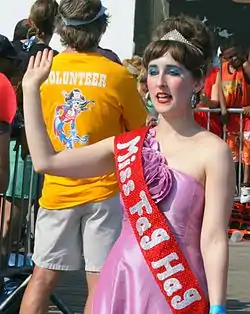Fag hag
A fag hag is, in gay slang, a woman who associates either mostly or exclusively with gay and bisexual men. The phrase originated in gay male culture in the United States and was historically an insult.[1] Some women who associate with gay men object to being called fag hags while others embrace the term. The male counterpart, for heterosexual men who have similar interpersonal relationships with gay and bisexual men is fag stag.

Usage
Fag hags are frequently stereotyped as outgoing women who are seeking a substitute for heterosexual relationships, or who are secretly (or openly) sexually attracted to gay men.[2][3] In fact, many women who identify as fag hags are already in romantic relationships, either with straight men or with women[3] but seek out the alternative experience of socializing with gay men.
Related terms
American fag hag synonyms include fruit fly,[4] queen bee, homo honey, fruit loop, Goldilocks, flame dame, fairy princess, gabe (a portmanteau of "gay" and "babe"), Tori (in honor of Tori Spelling and Tori Amos) and fairy godmother. Recently, cherry fairy has started to catch on as well in some select social groups in San Francisco and the East Coast, and gayboy bunny (a play on "Playboy Bunny" which originated in a Robot Chicken skit about 8 Mile and Looney Tunes) has been coined for fag hags who are attractive or have boyfriends to counteract the stereotype that fag hags are unable to find a suitable straight partner.
In the case of friendships between lesbians and gay men, the term dyke diva describes the gay man in the relationship. A straight man of platonic affinity with gay men is a fag stag; again, the usage is rare in mainstream sexual culture.
For men who have many lesbian friends the slang terms dutch boy, lesbro or dyke tyke apply.[5][6]
People who associate with lesbian, gay, and bisexual people may be called fruit flies regardless of their sex.[4]
Fag hags, fag stags etc. are regarded as belonging to the phenomenon of "hagism", the attachment of a person to a group defined by sexuality, even though they do not personally share that identity.[7]
The Japanese word okoge has a more neutral connotation. The German word is "Schwulenmutti" (literally: Mommy for gays), or "Gabi", the ironic used nickname for Gabriele or Gabriela.
In the Philippines, heterosexual women who develop deep friendships or almost exclusively associate with the native bakla LGBT subculture are known as babaeng bakla (literally "a woman who is a bakla [gay man]"). They stereotypically acquire the mannerisms, campy sense of humor, lingo (swardspeak), and fashion sense of the bakla. They are also usually more extroverted and socially dominant. It is commonly perceived as a positive self-identification, and various prominent local celebrities (like Maricel Soriano and Rufa Mae Quinto) openly identify as babaeng bakla.[8][9]
In popular culture
The term has often been used in entertainment. Comedian Margaret Cho has written and regularly talks in her stand-up routines about being a fag hag.[10] In an episode of the UK TV sitcom Gimme Gimme Gimme, Tom refers to Linda as a fag hag.[11] The term was also used in one of the episodes of Sex and the City, in which Samantha overheard two women discussing her relationship with the actor Smith Jerrod, calling her a fag hag.[12] English singer Lily Allen released a song called "Fag Hag" in 2008 as the B-side to "The Fear".[13]
The first annual Miss Fag Hag Pageant took place in New York City on May 17, 2009 at Comix with judges Caroline Rhea, Michael Musto, Hedda Lettuce and Katina Corrao. Heather Shields took the first prize.[14][15][16][17]
See also
References
- Moon, Dawne (1995). "Insult and Inclusion: The Term Fag Hag and Gay Male "Community"". Social Forces. Social Forces, Vol. 74, No. 2. 74 (2): 487–510. doi:10.2307/2580489. JSTOR 2580489.
- Dawne, 492–494.
- Thompson, Deborah (2004). "Calling All Fag Hags: From Identity Politics to Identification Politics". Social Semiotics. 14 (1): 37–48. doi:10.1080/1035033042000202915.
- Newall, Venetia (1986). "Folklore and Male Homosexuality". Folklore. 97 (2): 123–147. doi:10.1080/0015587x.1986.9716377. JSTOR 1259523.
- Stein, Joshua David (September 2009). "Straight Men and Their Lesbian Best Friends". Archived 2015-09-25 at the Wayback Machine Details, Retrieved on September 25, 2015..
- "Six rules for dyke tykes", Richard Wassersug, Curve, August 2005.
- Baker, Paul (2008). Fantabulosa: A Dictionary of Polari and Gay Slang. Continuum International Publishing Group. p. 140. ISBN 978-0-8264-7343-1. Retrieved 2008-07-23.
- Torre, Beatriz A.; Manalastas, Eric Julian (2013). "Babaeng Bakla: Friendships between Women and Gay Men in the Philippines". Philippine Journal of Psychology. 46 (2): 149–163. S2CID 55833746.
- Placente, Rommel (25 November 2019). "Rufa Mae not sure if she had a relationship with gay". PSR.ph. Retrieved 25 February 2020.
- Cho, Margaret. "On Being a Fag Hag". PlanetOut. Archived from the original on September 8, 2005. Retrieved 2007-01-06.
- "Do They Take Sugar?". Gimme Gimme Gimme. Series 1. Episode 4. 1999-01-29. BBC.
- "The Cold War". Sex and the City. Series 6. Episode 17. 2004-02-01. HBO.
- "Lily Allen – The Fear – UK CD Single". Discogs. Retrieved 26 September 2018.
- Rozzi, Giulia (2009-04-22). "The Miss Fag Hag Pageant". Take Part. Take Part. Archived from the original on 2009-05-03. Retrieved 2009-11-02.
- Musto, Michael (2009-04-29). "Miss California Banned From Competing in Miss Fag Hag Pageant". Village Voice. Archived from the original on 2009-12-12. Retrieved 2009-11-02.
- Hollenbach, Shawn. "Miss Fag Hag Pageant 2010". Mintyfresh. Archived from the original on 2010-05-14. Retrieved 2008-11-02.
- Musto, Michael. "Miss California Banned From Competing in Miss Fag Hag Pageant". La Dolce Musto. The Village Voice. Retrieved 2008-11-02.
External links
- Discussion of the anthropology of the phrase
- Fag Hag (1998 movie)
- Shepperd, D., Coyle, A., & Hegarty, P. (2010). Discourses of friendship between heterosexual women and gay men: Mythical norms and an absence of desire, Feminism and Psychology, 20(2), 205-224.
